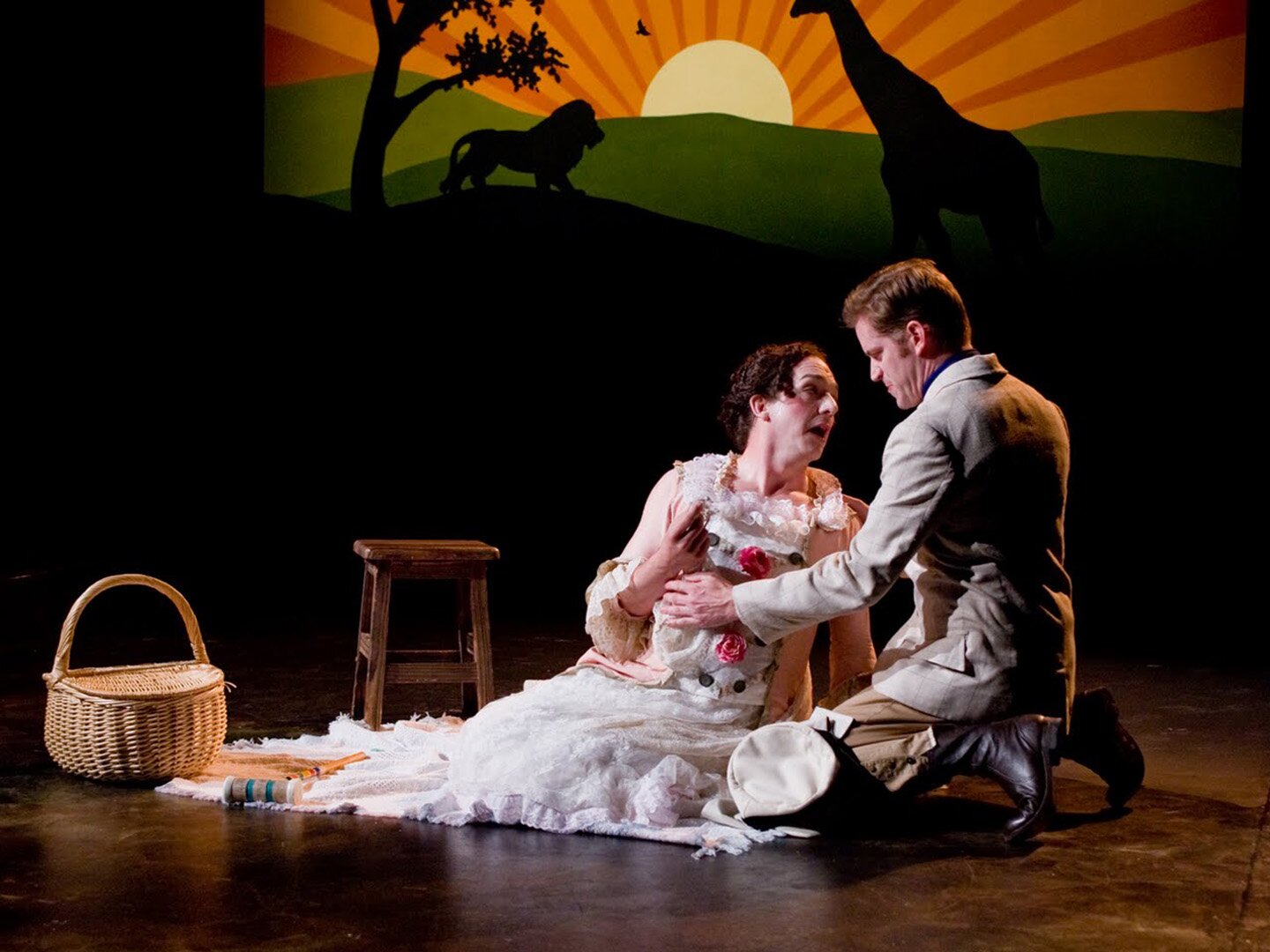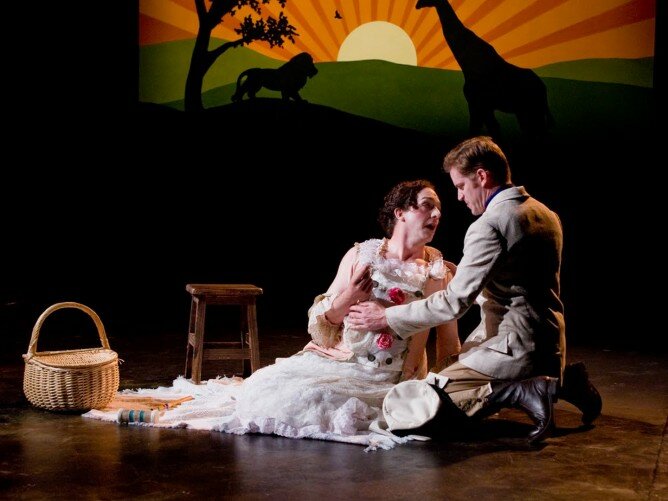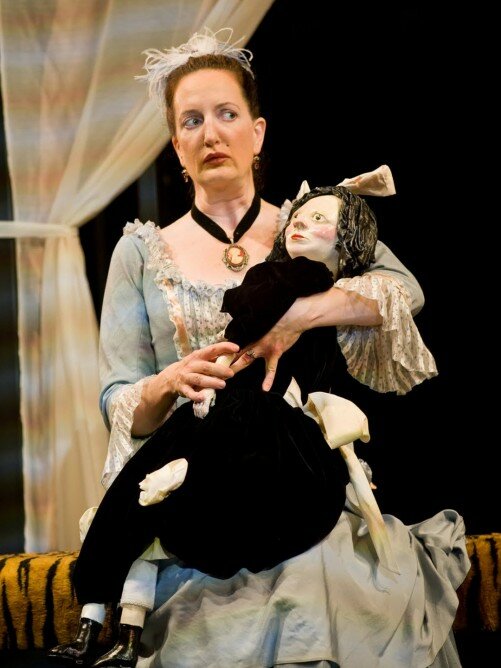First off, yes, Strawberry Theatre Workshop is an advertiser on The SunBreak, and we’re also sponsoring their run of Cloud Nine (playing through August 9, Thurs-Sat, Thursdays half-price, tickets $15-$30).
That said, if you think I wouldn’t have already been hoofing it to a show directed by Nick Garrison, then you, sir or madam or otherly defined being–Namaste–are sorely mistaken. Garrison was last at Strawshop in The Laramie Project, last at the Rep in This, or you may have seen him around town singing cabaret, with or without Sarah Rudinoff. Here he is chatting with Seattle Gay Scene:
Cloud Nine is Caryl Churchill’s once-experimental, still-challenging 1979 play, which among other things wants to contrast British colonialism and its cruel racial blundering about, with the ’70s liberation movement. This is an unwieldy package no matter how you stuff it, and so the play clocks in at about two and a half hours, with Act One given over to a Victorian family’s travails in Africa, and Act Two jumping ahead (with the same characters) to the ’70s, to see how they fare there.
If nothing else, it’s a chance for actors to show you what they’ve got under the hood: Women play men, and vice versa; a white man plays a black African; adults play children, also contrasexually.
But you also need a cast that can switch gears from the mostly satiric, slightly absurdist comedy of the first act to something much more authentically human in the second. Without backing off on the liberation project, Churchill also evokes the sometimes painful stretching of relationship ties as people try to create new ways of feeling at home in the world–this is why Garrison is an inspired choice to direct, because he’s as at home with arch, slapsticky, and bon mot humor as he is with moments that seem to cleave the characters to their vulnerable core.
Act One features Clive (Ian Bell) as a khaki-suited, blustering pater familias, his bored-to-tears wife Betty (James Cowan), their “unmanly” son Edward (Sarah Rudinoff), and daughter Victoria (a doll). Betty’s old-ironsides mother Maud (Imogen Love) lives with them. Governess Ellen (Gretchen Krich) looks after the children, but her heart beats (mostly secretly) for Betty. Joshua (Scott Shoemaker) is Clive’s self-loathing manservant.
They sing their introductions, and it quickly becomes apparent that this is a nursery Victorianism, a fantasia, a burlesquing of the sort of thing English children grew up being taught in elementary school long after the colonial era itself was rubble.
Two new arrivals, Harry (Basil Harris) and the Karen Blixen-esque Caroline Saunders (Krich again), quickly upset the apple cart. Harris plays Harry the explorer with his jaw set on matinée-idol stun, and his mind set on sex with anything that moves. Krich’s widow Saunders is doughty but also hot-blooded, and Clive is simply mad for this lioness. It’s mostly a no-holds-barred sex farce (with a pubic hair joke and pedophilia and coituses interrupted), but Shoemaker’s morose Joshua will floor you with a hymn, and Churchill makes the point that no one, really, was free, could get free–everything was contained.
In Act Two, you trade the pop-up savannah, floating Union Jack clouds, and buttoned-up duds (Greg Carter’s scenic and Anastasia Armes costume designs), for a more rubbishy, down-to-punk look. Andrew D. Smith’s lighting is cooler. Strawshop’s production is remarkable for not feeling like a period piece, given how topical this part becomes (a free love orgy to summon up the Goddess, a brother in arms in Northern Ireland)–for experimental theatre, it’s meticulously constructed, with the two acts mirroring each other in detail after detail. You may think that not every “i” needed to be dotted, but mostly you’re caught up in the change in the actors.
Rudinoff, for instance, trades in a sailor’s outfit for sensible wool, and gives an understated performance as a grown-up Victoria, negotiating a marriage-on-the-rocks with Martin (Harris, who delivers an unforgettable, glorious monologue on how much he, Martin, wants essentially to colonize Victoria’s sexual self). If anything screams ’70s, it’s Shoemaker’s reappearance as Gerry, Edward’s footloose, 4 a.m.-cruising lover, with his tales of easy, no-consequences sex. Shoemaker and ensemble get another terrific song here, backed by Robertson Witmer’s FM-radio sound. (Shoemaker and Witmer wrote new music for Churchill’s original lyrics.)
The older Betty’s diffident steps into independence and self-awareness (requiring awareness of her children’s selves, as well) are, by contrast, not that different from any older adult’s halting progression today, and if you want authenticity, watch how reluctantly and gently Rudinoff and James Cowan respond to Krich’s oscillations between mother-knows-best and curiosity about the adults her children have become. (The dynamite Imogen Love and Gin Hammond are credited for the dialect coaching, and the results are unusually strong for Seattle theatre.)
If the play peters out near its end–the symbolism of self love and acceptance having been overworked since the ’70s–you’re still in the position of coming back to yourself, having been away. If you see Cloud Nine, try to see it with someone who’s good for post-play conversation, because you will want to talk over what you’ve just seen.








